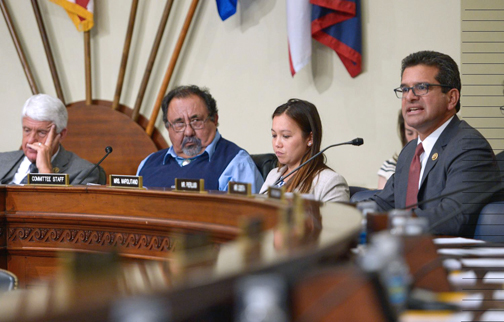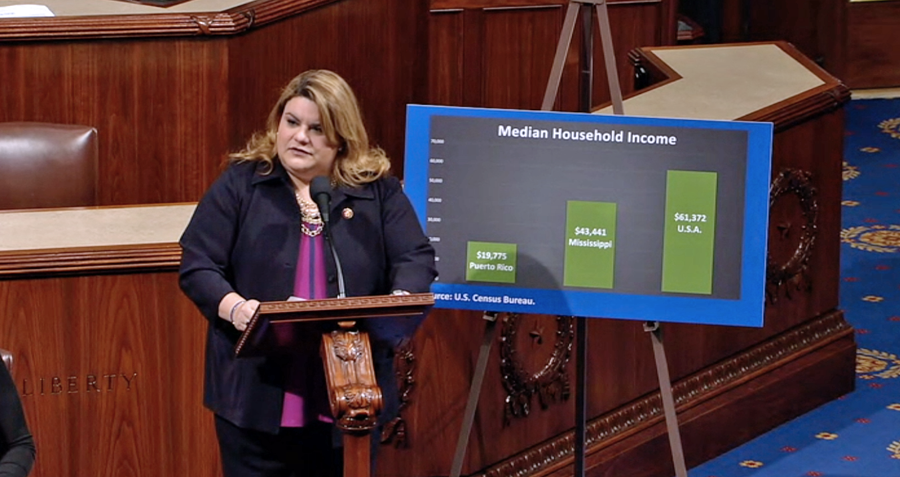‘PROMESA’ bill up for U.S. House Committee vote today


From left: Commitee Chair Rob Bishop, Congressman Raúl Grijalva and Resident Commissioner Pedro Pierluisi.
H.R. 5278, also known as the “Puerto Rico Oversight, Management, and Economic Stability Act,” which seeks to establish an Oversight Board to assist the government of Puerto Rico and its agencies in managing its public finances, will move for a vote by members of the U.S. House Committee on Natural Resources today, when nearly two dozen amendments will be considered.
During a brief markup session Tuesday afternoon, committee members including Puerto Rico’s non-voting member of Congress, Pedro Pierluisi, Congressman Raúl Grijalva — the committee’s ranking Democrat — and a number of others expressed their concerns over the bill. For the most part, “PROMESA” has bipartisan support at the committee level.
“In an emergency, the first step is to stabilize the situation. I have concluded that the revised version of PROMESA can accomplish this objective,” said Pierluisi during his remarks. “It pairs a comprehensive debt restructuring mechanism endorsed by the Treasury Department with an independent oversight board to help ensure that the Puerto Rico government conducts itself in a responsible, transparent, and disciplined manner.”
He went on to make five points about the bill, which he said “is necessary, but not sufficient,” expressing his dissatisfaction over how the government of Puerto Rico arrived to the point where an oversight board is being contemplated.
“Accepting a board is personally painful. But it is also the right and necessary thing to do. For those Puerto Rico politicians who seek broad debt restructuring authority but oppose an oversight board — get real,” he said.
Pierluisi said he would never support the legislation authored by U.S. Rep. Sean Duffy if it authorized a court-supervised debt restructuring mechanism that is unfair to the more than 330,000 workers and retirees in Puerto Rico’s severely underfunded public pension systems. He also expressed his opposition to the clause authorizing the island’s government to allow certain younger workers to be paid less than the federal minimum wage while the oversight board is in existence.
“In an otherwise bipartisan bill, this is the only instance where ideology has trumped intelligence. Nevertheless, I do not anticipate that the Puerto Rico government will ever use this authority, so its practical impact would be zero,” he said.
Finally, he acknowledged Puerto Rico’s “genuine emergency” urging committee members to look at the bill holistically to cast their vote.
“Any public official who opposes this bill has the responsibility to articulate a superior alternative approach that can actually become law. I do not believe one exists,” Pierluisi said. “In my view, the choice is between this imperfect but indispensable bill and no bill at all. And no bill is the worst possible outcome for Puerto Rico.”
Grijalva, who spent three days on the island earlier this month, said although H.R. 5278 is not the bill he would have drafted, he will vote in favor of it today.
He said the Oversight Board is too powerful, the minimum wage and overtime provisions should be excluded from the bill, while others should be inserted, such as pension protections, an Earned Income Tax Credit, and funding for Medicaid and a Zika response.
However, he said the bill includes the necessary tools to get the island’s economy on more stable footing, such as allowing the government to restructure all of its outstanding debt “without placing a finger on the scales to benefit specific creditors.”
But to that effect, Congressman Tom McClintock (CA) introduced an amendment excluding debt obligations guaranteed by the Commonwealth’s full faith, credit and taxing power. This includes the General Obligation bonds, which are guaranteed by the island’s constitution and must be paid before essential services and other public expenses.
The bill as it stands has raised opposition from Puerto Rico elected officials, including Gov. Alejandro García-Padilla and Senate President Eduardo Bhatia, as well as U.S.-based grassroots organizations.













